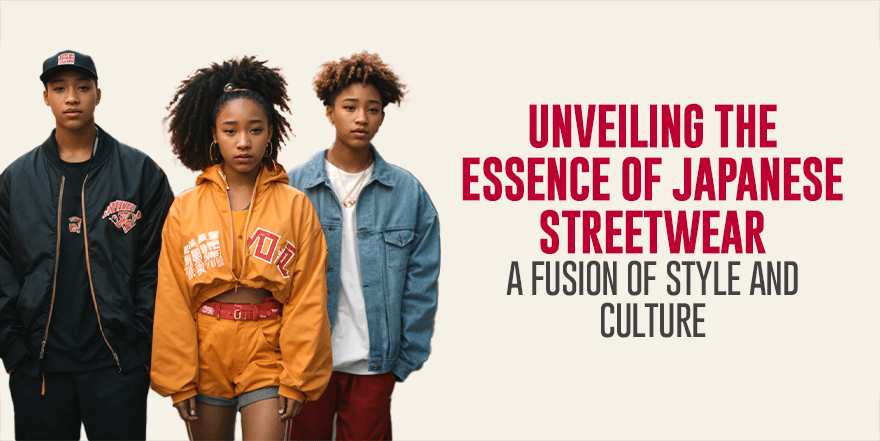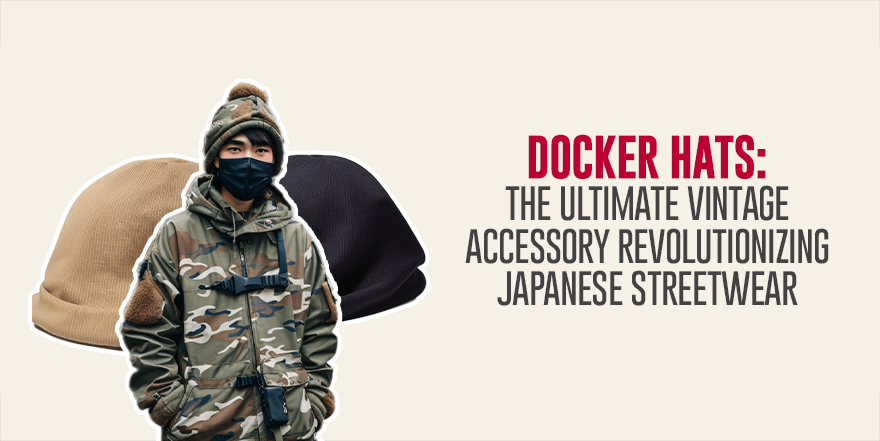Your Cart is Empty
Although Japanese fashion is overshadowing it, Chinese streetwear is well and truly present. It is becoming more and more important on the international scene, and rightly so. The main factor explaining this phenomenon is the propulsion of hip-hop in China.
How to explain the small delay that these trends took to settle in the Celestial Empire? Why is the popularity of Hip-Hop and streetwear experiencing such a phenomenal explosion in China? Let's go to the explanations without further delay.

Coming straight from the urban environment, Hip-Hop and Rap have known their glory days during the 90s. However, in China, it is only very recently that we start to be interested in it. Well, it's an understatement to say that it has become the news of the moment.
It is quite difficult to determine the how and why, but let's say that it is mostly related to the opening of China to the world. Having a youth eager for freedom and emancipation, it is an escape that symbolizes non-conformism and cultural resistance.
It is less difficult to understand the sudden change of course when one explores the question in its entirety. To do so, a little historical point is in order.
In recent years, China is slowly but surely beginning to expand its cultural horizons. And yes, Western trends have found their way in despite all the barriers that have been put up to prevent them.
In the 90's, hip-hop culture was in full swing in the United States. It was the favorite mode of expression for oppressed youth, the street revolution of sorts. Popularized in all four corners of the globe, all eyes were on the East and West Coast Rap clans.
Until then, shy in China, it is only until two or three years ago that Rap really takes off. For a long time closed on its own ancestral culture, the population was charmed by the novelties brought by the American Hip-Hop.
But it's still pretty strange that a music phenomenon takes almost two decades to reach a country. If you feel that there is something fishy going on, it's because the situation is actually much more complex than it seems.
Experts raise a much more logical theory: Chinese rap culture is imported from South Korea. A rather plausible hypothesis given the rapprochement of the two countries, and the chronological succession of events.

The South Korean boy band EXO
Thus, the success of the countless South Korean boy bands, and their occasional rap choruses, have eventually rubbed off on the neighbors. In fact, one of the most famous names on the scene is a former member of the pop group EXO. We'll come back to that in a moment.

Another important factor that could explain the success of Hip-Hop is (drum roll): a Chinese reality series, "The Rap Of China". Yes yes, just that! It all started in the summer of 2017 when a Korean TV show concept "Show Me The Money" was picked up, once again.
The principle was to gather a group of young rappers, and expose their creations to judges, or "producers". The best ones were selected for the grand finale, where they competed for record company contracts. One of the judges of the program was Wu Yifan, who was nicknamed Kris Wu, none other than the former star of EXO.
So let's agree on one thing: The Rap of China was a real success!
Just for reference, its episodes have been viewed more than 3 billion times on the Chinese streaming platform iQiyi. How is this possible? There are several pieces of evidence to solve this conundrum :
I might as well tell you that it was on everyone's lips, and that it made many people dream! This reality show had everything it took to become a hit, and not the least. At least, it was on the right track....
In China, rap music kept a low profile for several years. Under increased surveillance by the authorities, its influence was kept under control.
The wave of hip-hop that followed The Rap Of China raised serious concerns with the Chinese government. As nothing is taken lightly, a radical change was imposed on the directors.

The second season was dull, and much more restrained than the first. Opened with a patriotic song, devoid of vulgarities, and deprived of its rebellious soul, it had become a pale copy of the original.
And the politics of censorship had not yet said its last word. Things escalated quickly for the participants of the show. The aim was to deprive them of partnership offers by sullying their reputation in the eyes of the public.

The rapper PG ONE
While most of the focus was on the private life of the big winner PG One, the others were not spared. After accusing him of substance abuse and adultery, his runner-up, rapper GAI, and another co-star, VaVa, were banned from reality TV for a long time.
At the same time, a fight against all the symbols of revolt that Hip-Hop conveyed was conducted. Tattoos were one of the first elements on the line of fire. A sign of belonging, individualism and revolt, they did not want it to gain in popularity. On national television, even well-known celebrities were made to hide them by wearing long sleeves, or using make-up.

The rapper GAI
However, in Shanghai, Hip-Hop still has a great future ahead of it, and there are tattoo artists on every street corner. This proves that once the seed of hope is planted, nothing can take it away! Chinese rap is now an integral part of the country's modern culture.
Streetwear has become a real culture in China, and not without reason. Behind this huge success are two pillars of hip-hop fashion, Yoho! and CLOT. To put it simply, they are the major force that propels streetwear to new horizons.
Both are intimately linked to current Rap influences. That's why, before telling you about Yoho! and CLOT, we explain you why Hip-Hop and Chinese streetwear are inseparable since so many years.
Hip-hop artists tell modern stories and myths, and shape our youth with their liberating and forward-thinking spirit. Somehow, the same is true for streetwear, which is why the two fit together so well.
In America, the rap movement has shaped the first urban fashion trends. We have oversized clothes and over the top sneakers. Similarly, Asian streetwear has its origins in working-class neighborhoods and rap bands.
Tmall, a branch of Ali Baba, is one of the biggest services that connect businesses and consumers in China. According to them, urban styles have been on the shelves for a long time. Nevertheless, the rise of interest in them has coincided with the release of The Rap of China.

Throughout the show, the participants wore major brands like Supreme, Off White and Nike. They familiarized their audience with the western style of clothing. In a second step, purely Japanese brands challenged themselves to revisit these creations by adding their own Chinese touch.
The results are quite stunning, and capture the Eastern heritage and modern trends in perfect harmony. A mode of artistic expression that crisscrosses the Chinese streets..
Streetwear in China is not just a fashion movement, but a full-fledged youth culture. With more than 400 million young people, it is only natural that the new generation is constantly looking for originality. This burning desire to stand out from their predecessors is the force that drives the soul of streetwear.
But as we are told too often, you can only live on your dreams without having anything concrete. And the young Chinese, precisely, have the means of their policy!
What is surprising is that this is a direct consequence of the one-child policy adopted in China in the 1970s. Thus, the majority of families having only one child, the young Chinese found themselves quite well off.
Instead of turning to expensive luxury stores, they allowed themselves urban fashion treats. It doesn't matter if it's expensive, as long as they can afford it and follow the hip-hop and streetwear trend of the KOLs (influencers in China).

Indeed, according to a study published by Bain & Company, the average age of luxury streetwear customers in China is 35. For reference, this is at least a decade different from Europe or the United States. Other fashion experts claim that the average is even younger, only 25 years old.
With all these elements, you should have a better understanding of this very particular link between streetwear and the Hip-Hop culture of the new generations. However, this won't really be the case if we don't tell you about the pillars of streetwear in China: CLOT and Yoho!
CLOT is a purely Chinese streetwear brand that has established itself as a true bridge between the West and the East. Founded only in 2003, it has become a real streetwear movement in its own right.
CLOT is not just a brand, but a real immersive experience that comes from the prodigious mind of Edison Chen and Kevin Poon. Their original concept aims to make a mashup between the streetwear of France, the prodigious art of Hong-Kong, the unique designs of Los Angeles, all combined with the talents of Australian artists and the unique quality of Japanese fabrics. That's how much of a philosophy CLOT is.
So in 2018, to celebrate the brand's 15th anniversary, a fashion show is simultaneously held in the world's biggest cities. This latest CLOT presentation proves once again that the brand is a true fusion of streetwear styles from around the world.
It's not without reason that COLT has been compared to the Narnia world of hip-hop!
On the other hand, if COLT is an authentic streetwear movement in China, one can say that Yoho! is the cultural empire that boosted it to become a movement in its own right. Indeed, many attribute the success of Chinese streetwear to this brand.

To put it simply, there's nothing better than the words of Liang Chao, the man behind Yoho! : "You want to be cooler? Nothing more simple, come to Yoho! ".
It is not without reason that this brand is considered the First Cultural Empire of China's youth!
In a word, Chinese streetwear, which is inseparable from the hip-hop movement, has turned clothing standards upside down. It is a breath of fresh air that symbolizes resistance and freedom. Once again, the urban mentality prevails!
Comments will be approved before showing up.
By Credit & Debit Cards, Paypal or Apple Pay
For all orders over $100
We're available 7 days a week
Reply within 24 hours
Not loving it?
Free return within 30 days


